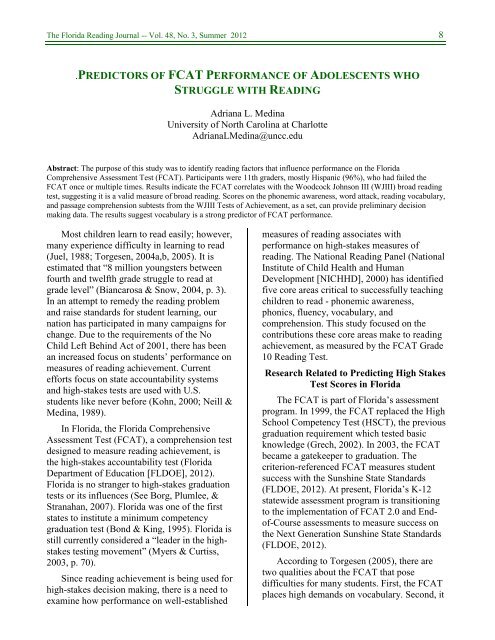PDF (Adobe Reader) - Florida Reading Association
PDF (Adobe Reader) - Florida Reading Association
PDF (Adobe Reader) - Florida Reading Association
You also want an ePaper? Increase the reach of your titles
YUMPU automatically turns print PDFs into web optimized ePapers that Google loves.
The <strong>Florida</strong> <strong>Reading</strong> Journal -- Vol. 48, No. 3, Summer 2012 8<br />
.PREDICTORS OF FCAT PERFORMANCE OF ADOLESCENTS WHO<br />
STRUGGLE WITH READING<br />
Adriana L. Medina<br />
University of North Carolina at Charlotte<br />
AdrianaLMedina@uncc.edu<br />
Abstract: The purpose of this study was to identify reading factors that influence performance on the <strong>Florida</strong><br />
Comprehensive Assessment Test (FCAT). Participants were 11th graders, mostly Hispanic (96%), who had failed the<br />
FCAT once or multiple times. Results indicate the FCAT correlates with the Woodcock Johnson III (WJIII) broad reading<br />
test, suggesting it is a valid measure of broad reading. Scores on the phonemic awareness, word attack, reading vocabulary,<br />
and passage comprehension subtests from the WJIII Tests of Achievement, as a set, can provide preliminary decision<br />
making data. The results suggest vocabulary is a strong predictor of FCAT performance.<br />
Most children learn to read easily; however,<br />
many experience difficulty in learning to read<br />
(Juel, 1988; Torgesen, 2004a,b, 2005). It is<br />
estimated that “8 million youngsters between<br />
fourth and twelfth grade struggle to read at<br />
grade level” (Biancarosa & Snow, 2004, p. 3).<br />
In an attempt to remedy the reading problem<br />
and raise standards for student learning, our<br />
nation has participated in many campaigns for<br />
change. Due to the requirements of the No<br />
Child Left Behind Act of 2001, there has been<br />
an increased focus on students‟ performance on<br />
measures of reading achievement. Current<br />
efforts focus on state accountability systems<br />
and high-stakes tests are used with U.S.<br />
students like never before (Kohn, 2000; Neill &<br />
Medina, 1989).<br />
In <strong>Florida</strong>, the <strong>Florida</strong> Comprehensive<br />
Assessment Test (FCAT), a comprehension test<br />
designed to measure reading achievement, is<br />
the high-stakes accountability test (<strong>Florida</strong><br />
Department of Education [FLDOE], 2012).<br />
<strong>Florida</strong> is no stranger to high-stakes graduation<br />
tests or its influences (See Borg, Plumlee, &<br />
Stranahan, 2007). <strong>Florida</strong> was one of the first<br />
states to institute a minimum competency<br />
graduation test (Bond & King, 1995). <strong>Florida</strong> is<br />
still currently considered a “leader in the highstakes<br />
testing movement” (Myers & Curtiss,<br />
2003, p. 70).<br />
Since reading achievement is being used for<br />
high-stakes decision making, there is a need to<br />
examine how performance on well-established<br />
measures of reading associates with<br />
performance on high-stakes measures of<br />
reading. The National <strong>Reading</strong> Panel (National<br />
Institute of Child Health and Human<br />
Development [NICHHD], 2000) has identified<br />
five core areas critical to successfully teaching<br />
children to read - phonemic awareness,<br />
phonics, fluency, vocabulary, and<br />
comprehension. This study focused on the<br />
contributions these core areas make to reading<br />
achievement, as measured by the FCAT Grade<br />
10 <strong>Reading</strong> Test.<br />
Research Related to Predicting High Stakes<br />
Test Scores in <strong>Florida</strong><br />
The FCAT is part of <strong>Florida</strong>‟s assessment<br />
program. In 1999, the FCAT replaced the High<br />
School Competency Test (HSCT), the previous<br />
graduation requirement which tested basic<br />
knowledge (Grech, 2002). In 2003, the FCAT<br />
became a gatekeeper to graduation. The<br />
criterion-referenced FCAT measures student<br />
success with the Sunshine State Standards<br />
(FLDOE, 2012). At present, <strong>Florida</strong>‟s K-12<br />
statewide assessment program is transitioning<br />
to the implementation of FCAT 2.0 and Endof-Course<br />
assessments to measure success on<br />
the Next Generation Sunshine State Standards<br />
(FLDOE, 2012).<br />
According to Torgesen (2005), there are<br />
two qualities about the FCAT that pose<br />
difficulties for many students. First, the FCAT<br />
places high demands on vocabulary. Second, it



